#Don't know why I fixated on pride and Prejudice
Text
Tim, looking around the darkened corridor: "You think it's a good idea to be breaking into random places right now?"
Jason said nothing, fumbling in his pockets.
Dick: "You live here, don't you?" Which gets everyone's attention laser-focused.
Jason just cast him a look, getting the door open.
Steph entered first, smacking into something that falls over. "Jeez." She complained, stumbling backward until Cass steadied her by the shoulders. "Sorry, that's my bad."
Duke turned on the lights in one motion, making everyone blink and wince.
"Get off me." Damian snapped, and Dick carefully let him go, letting him limp angrily into a chair. He frowned, scrutinizing the place. "You live here? Why would anyone--"
"Guys." Dick rubbed his eyes over the mask, cutting off Damian and Jason’s sharp answer. "First aid kit?" Dick asked Jason tiredly.
Jason nodded, moving to get it and heard Damian ask "What?" in response to a patented glare he must be getting.
Tim had made a beeline for the kitchen. "Dude, why do you have a singular set of dishes? And why are there just guns in this cabinet?"
Jason scoffed, handing Dick the kit. "Didn't realize I was running a fucking bed and breakfast."
"There's guns in this cabinet too!" Tim shook his head, opening and closing two more. "Oh good, just large knives in this one."
At Tim's raised eyebrows, Jason went into the kitchen and shooed Cass down the counter she was perched on, grabbing the paper plates he kept in a drawer and shoving them into Tim's chest.
Glancing at the way Steph was rubbing her neck, slouched at the table, Jason grabbed two ice packs, sliding one her way and throwing the other to Damian.
Duke, taking a book off Jason's meticulously organized shelf: "Why do you have seven copies of Pride and Prejudice? Did you keep forgetting you bought it, or--?"
Jason, storming over to put the book back. "Stop."
Dick looked up from the wound he was stitching. "Are they different at at all?"
"Are they in different languages?" Steph asked.
"Did you barter them for food? Because your fridge is fucking empty." Tim reported.
Jason groaned, realizing that they weren't going to drop it. "One has a different introduction and one is the zombies version. And yes, the rest are the same, now could you all stop touching stuff?"
"Why do you have five copies of the same book?"
#New format I'm testing out: too lazy to write a fic and too content heavy to be a text post#I present to you minificpost#Batman#Dc comics#Mini something#Batfamily#Jason Todd#Dick Grayson#Duke Thomas#cassandra cain#stephanie brown#damian wayne#Tim Drake#batfam#Don't know why I fixated on pride and Prejudice#Man reads other books too lol
2K notes
·
View notes
Note
Two questions; is your current fixation still Shingeki no Kyojin?
Secondly, if you have time, I want to hear your thoughts about a recurring thought I have. Would you agree that men don't tend to take media made for women seriously? Doesn't matter if it's made by a woman, but media or things in general made for girls. The two main things I think about is the Barbie movie and anything by Jane Austen. A lot of conservative bros I see have a legitimate hate for both of those things and ...Why? I think they're both really important for different reasons and I don't understand the perception of "silliness" around them. I mean, Barbie obviously is silly in a lot of ways but.... It's a Girls Girls movie, like how Braveheart is a Mans Mans movie and also is a bit silly in the way that men are (but it's still one of my, a girls, favourite movies).
Maybe it could be said that girls don't generally understand media made for men either, since a lot of girls hate reading Charles Dickens or Mark Twain. But neither of those author's really made them "for men," it's just that men seem to gravitate towards them -- and at the same time, you don't hear women saying they want to take Mark Twain's jawbone and beat him over the head with it (quote from Ben Shapiro about Jane Austen. He was joking but it still rubbed me the wrong way).
Yes, in the sense that I'm not fixated on anything else, but no, in the sense that I'm avoiding SNK content until I can reread/rewatch before (finally) viewing the finale.
Next, I think men do have a hard time taking women's media seriously, but part of the reason is that media geared toward solely men or solely women isn't generally setting out to be the most serious thing in the first place. I don't know anyone, male or female, who takes chick flicks and action movies seriously, and if we get the sense that a new film leans toward one or the other (even if it doesn't strictly fall into that genre), we reach a conclusion about it in that moment because there's only so much time in the day and money in the pocket we can devote to entertainment.
But then, not taking something seriously is very different from legitimately hating it. I can understand why a man would hate the Barbie movie, especially if he hasn't seen it. Like all feminist media, it's going to be about how all men are oppressors and all women are their victims, right? And that's obviously a despicable message worthy of hatred. And if he's already decided that's what it's going to be about, he's probably not going to change his mind when he watches it, because as I've previously explained, Greta Gerwig failed to send a consistent message, as she has failed to do in all her blockbuster movies. I've described her to my mother as "a conservative trapped in a liberal's body." She just can't reconcile the two belief systems that drive her. (Conservative men aren't the only people who hated it either, I know plenty of conservative women who hated it. And I know conservatives of both sexes who enjoyed it immensely.)
Very rarely do I see a man's film morally disparage women the way that so many women's films do to men, and this probably contributes to more men hating women's films than vice versa.
I think it's true that neither men nor women can fully understand the appeal of media made for the other, but because we are complementary, I do think we owe each other at least an attempt to understand. Which, by the way, is never going to work for you if you've accepted the premise that we are fundamentally the same in spirit and our differences are merely social constructs.
Finally, as concerns Ben Shapiro and Jane Austen, he actually was quoting Mark Twain in that segment, and this is a delightful background of Mark Twain's self-proclaimed--but spurious--hatred of Jane Austen. But for any guys out there who do think Austen is "chick lit," just about every homeschooled boy or homeschooling father I knew loved Jane Austen's work and considered Pride & Prejudice an invaluable tool for the raising of honorable men. Here's an article about why.
#- HK#respublica#Austen#on a more fundamental level you have to consider how women are oriented vs how men are oriented#women are people-oriented and men are objects-oriented#so women operate more on nuance and abstraction whereas men operate more on generalities and function#if you say 'that's not true I'm a woman and I--' you're proving my point#so just for a moment embody with me the Platonic ideal of a man and imagine you're watching a woman's movie#(keeping in mind the Platonic ideal of neither actually exists)#you can acknowledge that it's a good movie for what it is--the message is great and the film is well-made#but it's 90 minutes of conversations - meetings - the inner life of the mind#nothing is *happening*#now imagine you're the Platonic ideal of a woman watching a man's movie#same sitch: good message strong film#but it's 90 minutes of fighting - explosions - riding horses up to the mountain peak#we don't know what the MC is feeling or why he's doing anything or what his mother thinks about it. it's just a string of events.#nothing's *happening*#this is why The Lord of the Rings is the perfect film
10 notes
·
View notes
Text
9 People You Would Like to Get to Know Better.
thank you for the tag @merlyn-bane!! <3
Three ships: Gotta go codywan starwar for the current fixation, but damen/laurent captiveprince got me to write fic for the first time so they're pretty high on the list too! I got stumped for a third one so looked at my own ao3 bookmarks to see what I consume the most and it's pretty much a tie between cherik xmen and sterek teenwolf. Sorry for using the IP like a surname for all of these guys
First ever ship: I don't know if I had that much self-awareness when consuming media to realize I was shipping anyone in my early years but honourable mentions are probably damen/laurent for inspiring my first fanfics, and, like, probably elizabeth/darcy from the 2005 pride and prejudice movie because I have no shame
Last song: Goodbye Evergreen by Sufjan Stevens. whoof
Last movie: Witches of Eastwick (1987) for the first time a couple nights ago. Not a fan of Jack Nicholson, but a big fan of Cher, Susan Sarandon, and Michelle Pfeiffer, so what can ya do. Currently working through my semi-spooky october watch-list, message me if you want to know!
Currently reading: I'm crazy and read too many things at once, so, One Last Stop by Casey McQuiston, Dance Hall of the Dead by Tony Hillerman, A Deaccession Reader by Stephen E. Weil (non-fiction), and Opened Ground by Seamus Heaney (poems). Have also just barely started The Eye of the World by Robert Jordan, and Something Wicked This Way Comes by Ray Bradbury!
Currently consuming: water my beloved, combined with the rare fling, dill pickle potato chip
Currently craving: someone to finish cutting out shirt pattern pieces for me. I love sewing but why is cutting the worst part
No pressure tags @damiaanos, @goddammitjim, @thatgothlibrarian, @cabezadeperro, @adiduck, @elwenyere, @andthepeople, @thegreencarousel and anyone else who sees this and wants to have a little tag game fun :)
6 notes
·
View notes
Text
One of my most favourite confrontations between Mahidevran and Hürrem in the series is the one after Mahidevran sent Olga to Süleiman in episode 61. It's both fun, yet filled with meaningful character dialogue, managing to successfully deliver a thematic message that eventually finds its retroactive way, despite of it all seeming like a yet another smackdown fest by Hürrem at first.
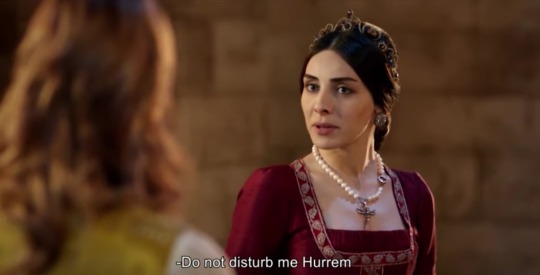
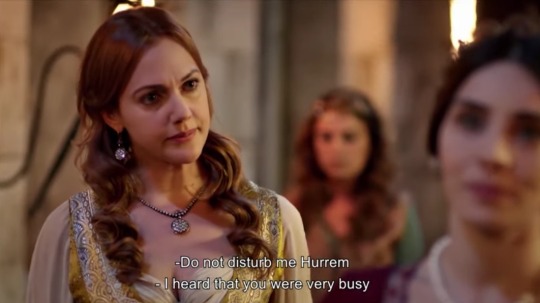
The scene begins with their typical confrontational energy, the rivalry chemistry immediately paves its way forward. Hürrem is ready to face her for what she did and Mahidevran, while not being interested at first, goes with her flow regardless, setting the mood for what follows.
Hürrem: You've sent a concubine to his majesty.
Mahidevran: I'm replacing Valide. Pleasing his majesty is one of my duties.
Hürrem: Let God not give you other worries. Do you want to cover the lack of your femininity this way?
Mahidevran seems very engrained in her role as the head of the harem and connects it with her own desire to take revenge for her wounded pride and for all the pain they caused her. The first excuse she finds for sending Olga to SS refered to the rules and tradition that give her that right, but we know by context that there's something else going on, this was both a move driven by her vendetta and a provoked move - she decided to do this after Hü told her she's the one ruling the privy chamber and perhaps Mahidevran accepted it as a challenge to her power, because, honestly, I doubt she would've attempted such a thing if she weren't provoked like this. Hürrem, on the other hand, gives her own "interpretation" as to why Mahidevran took action. To be blunt, it sits wrong with me right from the start, because it demonstrates a huge amount of internalized mysoginy on full display and it's sad, in a way, that this is what the system encourages at the moment - you're nothing if you sleep alone in your bed, if you don't have the sultan's back. There's a glimmer of possibility Hürrem said it only to render Mahidevran vulnerable and one could understand where she comes from, since she has experienced quite a lot of similar offenses from that same person. And when a confrontation of the like occurs, her first instinct is to think of a comeback, to pull rank and highlight why she's better than her like she does in all their encounters in this batch of episodes. That hardly excuses or whitewashes this statement, though, because for a person who has been shown to fight the system and call out prejudice (even though it was mostly only she was subjected to it or it was about something that concerned her specifically), seeing that she had absorbed some of it and applies it without a second thought leaves a sour taste for me.
Mahidevran: Worry about your own problems, Hürrem. Did you really think his majesty couldn't be with other women?
Hürrem: This is impossible.
Two major beliefs of Mahidevran and Hürrem's characters come on the surface: they drive the dialogue and help the rest of the scene unfold the way it did. Mahidevran brushes off Hürrem's last statement and brings back tradition to the forefront, which begins to highlight a belief of hers that she shared with Valide, that there is a constant cycle in the harem that no one, not even Hürrem, is capable to entirely break. To Hürrem it's impossible for SS to ever have other women at this point, it's something unthinkable for her already. She feels she has fully broken that cycle.
This scene, unlike the confrontation in episode 58, has well done retroactive irony while serving the context of the episode it's in in a plausible enough way that doesn't seem showed in just for the sake of it. The context of the episode puts Hürrem in the right by showing Olga returning from SS's chambers almost immediately after Hürrem says: "This is impossible." and it's the place where this plot-line transitions to another one, leaving the rest of the confrontation to hang in the balance for a while. Maybe SS had truly given up taking other women ever since the wedding, as shown by this and SS refusing another concubine sent by Valide in the wedding episode.
However, we know that this stops being the case later on and whether it's through the decision to bring in yet another drama tool, yet another annoying stretched narrative opposition in the face of the concubine arcs, it's a fact and we could say that this scene ends up being a good enough framework to set us up for it, intentionally or not.
Mahidevran: Then why is there a concubine in his chamber?
Hürrem: What concubine? Maybe that one?

This, to me, is a demonstration of how the tables can turn in the harem at literally any moment. Meryem Uzerli's little amazing, subtle facial expression says it all. When Mahidevran asks the question, we see for a very split second that Hürrem's wondering how to refute her until the concubine appears in the heat of the argument due to sheer luck. Like, if she had already returned to her rooms before the scene occurred, it would've gone much differently! This isn't all that important here, but I love how Meryem showed a slight probability for Hürrem to lose the argument, which contrasts with all her confident remarks before and after this moment. It's just very neat stuff.
Hürrem: Many girls were introduced to his majesty. Among them, there was even a princess. Where are they now? Look around you. You will not see anyone but me.
Speaking of confident remarks, there comes another one of Hürrem's that no matter how many concubines came, they all went and now there is no one other than her. This line further sets a consistent trend of ambiguity, because she's right in the context of the episode and it encapsulates the resolution of these particular plot-lines of Hürrem and Süleiman in the season and we can get behind her words overall both in the arc and in rewatch, in spite of the retroactive irony, but she's wrong in that it's the end of her harem fights, very far from it, as season 3 and season 4 prove. She hasn't completely won yet, even though she sets the impression that she has.
What I also find interesting in this scene is the back and forth throwing of past - present - future between the two sides. They make a perfect showcase of what these characters represent, their states, their losses, their desires, their hopes, dreams and philosophies. Here, in example, Hürrem makes a reference to a part of her obstacles in the past, acknowledging that they were there regardless, but then she immediately goes back to the present with "Where are they now?". Nowhere in the scene she considered the possibilities of the future, the sheer probability that it all may change one day (as it happened, in many ways, through Firuze), focusing on the currently undeniable truth the present day presents.
That same throwing back and forth continues, but with another note which instantly places the two women against each other again:
Mahidevran: I was also loved once, Hürrem. Mustafa is the fruit of that love. Ask Gülfem Hatun if you want. She will tell you how much she suffered because of me.
Hürrem: You always tell this story.
Unlike Hürrem, who only references the past, Mahidevran laments it and takes pride in it, it being the highlight of her once beautiful life. But we know what went down afterwards, adding in the possibility that maybe, it would all be temporary and what one may have now, may change, because Mahidevran was also in Hürrem's position once. Hürrem however, calls out her fixation on the past, in a similar fashion to how she has done it before (E59: "Are you being proud of your past now? Let me remind you: You're still a slave."), what she had doesn't matter, it's the now that is important to Hürrem, which is a solid thematic note to her character arc.
Though, we have this line of dialogue in response:
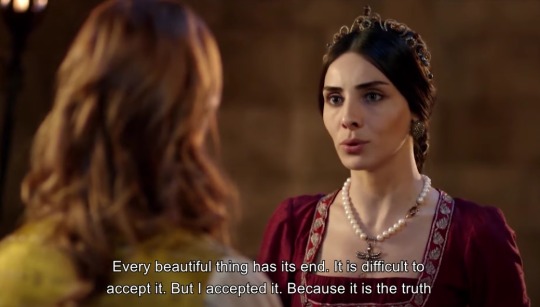
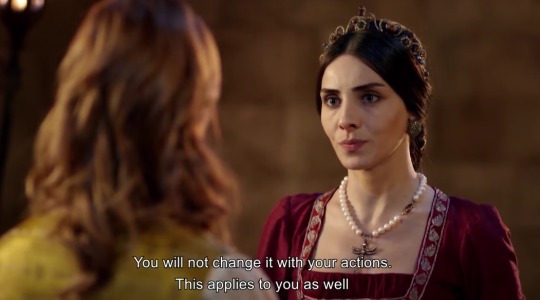
We here notice that no matter how long it took for them to do it, Mahidevran and Hürrem actually had parallel arcs, in terms of letting go of the past. This line makes for such a striking revelation of Mahidevran's emotional state from her perspective that only continued what episode 46 hinted at and episode 55 directly started. (E55: "I ripped out the love I had of your father of my heart, I threw it into the sea! He doesn't matter to me anymore. Now you are the only one in my heart.") It's rather surprising that she says these words now - Mahidevran's rule of the harem is arguably her at her worst, doing what she does out of the last ounces of her wanting payback for the sad, bitter years. It's precisely what she lost that motivated her, that was a sure part of the reason she sent Olga to SS and yet, we have that honest confession, that grasp of acceptance. Mahidevran's battle with SS was lost very early on and it took her very slow and gradual development for her to accept it and by E61, she was doing the last steps to do so. She tries hard to convince Hürrem that no matter how hard she tries, there is a cycle in this harem that cannot be changed, Mahidevran has come to terms with it, so Hürrem has to do the same. In a way, she was probably trying to say that they both have been fighting a losing battle and she expresses a small amount of sympathy over it, too - she knows what it's like and it's hard, but it's like some unwritten law that it's not worth it in the end and that everyone gets affected by it, without exception. That's how she begins to look upon her present and show a hint of the future.
Out of the particular context, this line could be a very nice stronger endorsement of the franchise's themes, because, truly, no one ever got a good, triumphant, heroic ending. And it was like a cycle: everyone had to face the feelings of sorrow, grief and loss, everyone had to suffer in this time period, everyone dies. Gülfem called Hürrem's life a fairy tale in E134, but that "fairy tale" came to an end after her death. And if we leave that aside, there is hardly a breather episode even for the biggest of victories, no matter how many victories you've won, they would always "have their end", the narrative would always condemn them one way or another.
Mahidevran: One day a woman will appear and would destroy your indestructible love!
The future is finally put on the front with the scene overall and with Mahidevran herself. It's a continuation of her belief that Hürrem would be "detroned", regardless of all. Thing is, she also doesn't consider her own future, only the one of her rival's. She believes in her own victory that is opposed in the present, but would surely come in the future, a belief she holds until the end of the series. Even though I doubt the writers planned Firuze's existence right back then per say, this line sounds like such foreshadowing to her in retrospect, which makes Mahidevran both right and wrong with this quote. Firuze caused an actual continuous rift between Hürrem and Süleiman, making her doubt his love in ways she hadn't before. Nazenin comes into the picture, as well. But no one truly succeeds to properly destroy the love between Süleiman and Hürrem and they managed to prevail, despite of all the narrative opposition. She still stayed the most dear woman to SS's heart, no matter what. There is a slight possibility of Mahidevran judging the situation one hundred percent to herself here, claiming rather that the appearance of another woman would make Hürrem fall out of love with SS and destroy that, instead, just like it was with her, but since Mahidevran called the same line back during the Firuze episodes, I think she was referring to the rift Firuze would cause and how would Hü fall deeper and deeper.
Hürrem: Mahidevran, don't think of me as your equal.
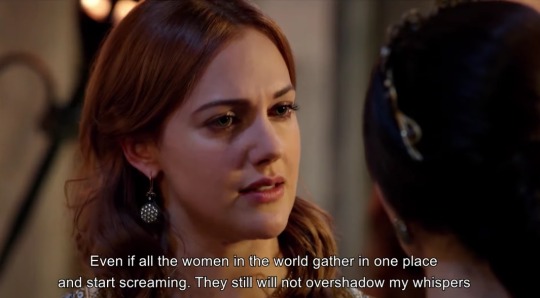
This line is very telling in that Hürrem considers herself different than everyone else. It has always been a part of her character, perhaps a running reminder of her unprecedented elevation in the system she's telling us about through words. And most of the interpretations I've encountered of this line are exactly this: it is epic, badass, it is delivered in such a shading sassy way that could only be respected or applauded. However, it is just as possible for this infamous one-liner to be presented as the culmination of not only her persistent insistence to assert herself as different and special, but her continuous unwillingness to be compared to anyone else in the harem. And usually she's compared to guess who? Mahidevran. She doesn't want to even think of the possibility to be compared with her by this point (starting from E40 where after she was freed, she said: "Now I'm not equal to you." right to Mahidevran's face and continuing forward into S03 with: "I told you not to compare me to others, to Mahidevran never!" -it was something like that), but at first, which is now probably buried deep within, she feared becoming like Mahidevran. She repeated "I'm not Mahidevran!" when she was out of favor like with the Russian concubines, Mahidevran's words that she would make the same mistakes she did echoed in her head during the Isabella arc in episode 31 and earlier had a nightmare of Süleiman giving the emerald ring to Mahidevran instead of Hürrem in a completely parallel scene. (there's also the other nightmare where Mahidevran was taunting Hürrem to tell her about Leo.) Hürrem dreaded all of those things happening and tried her very best to avoid the very thoughts of it. Now, in a season nearly full of victories in her part, she had gained the belief that whatever happens, she'll always stand above the others. She wants to give off the vibe that no one would ever stop her. She has broken so many traditions and the narrative is currently rooted at her favor, all well and good, right? This line could be a mask, in a way, hiding the fear of being rejected just like the others (that doesn't completely disappear, seeing her suicide attempt in E72; also E106's menopause plot.) and striving to leave it behind her, now reaching its peak by putting not only Mahidevran, but the rest of the women into the picture, without a second of realization of the implications it causes, because well, who else was given such special attention by the Sultan? Who else was freed, who else had such a marriage, who else got out of death's door so many times, who else overcame everything, who else had a chance to "rain as fire" over all her enemies? Even though the quote applies on a much grander scale in execution, in later seasons and the way it got called back to in MCK, I feel, in this particular context, it refers to the harem and Süleiman specifically - his majesty doesn't need any other women, there is no such woman that could take away what Hürrem has and even if they stand together, they wouldn't stand a chance, because Hürrem is that massive and powerful.
The retroactive irony hits hard and here: she's right in the events of this particular episode, but the subsequent events definetly tell a different story. Hürrem's influence and power is acknowledged, especially in her last episodes, but that she's the only one capable of having such power is not necessarily true, given the existence of the SOW, some members of which reached more highs than she did, due to the evolving extent of power they could exercise in the system.
Mahidevran: Your arrogance will end you, Hürrem! One day when you're suffering in pain, I'll remind you this!
Hürrem: Mahidevran, you're not here anymore. You'll be leaving soon!
Mahidevran: You're not powerful enough for that!
The focus on the present and future is back with this quick, but substantial exchange. Mahidevran seems to count completely on what will happen in the future in the first line, while Hürrem accounts for both the present and the future, seemingly in accordance, and Mahidevran brings the confrontation back to the present, for what Hürrem talks about is currently unattainable. These lines look like a brief summary of what was established before about the beliefs of both characters: they both desire the end of one another - for Mahidevran it would happen eventually, because Hürrem would end herself in her eyes and Mahidevran would live for this moment and even witness it (and while she didn't witness it exactly, she lived and outlived them all, because there would be no death for her until they get what they deserve, a belief that carries on the strongest in season 4); for Hürrem it has already happened, but it would keep going, fueling her will to get rid of all her enemies and being in conjunction with the ongoing plot arc itself, for her attacking her enemies in all fronts in ways she hadn't before. The last line of Mahidevran's stops the dialogue between both of them for good (followed by Hürrem's smug grin), resting back on her current position, that is also how her whole set of dialogue began in the first place. Even though there was a hint of realization that she has been fighting a losing battle a while before, the part of hers that would prefer not going to the sanjack than give up now, is directly reflected on. It sets more of a parallel between how both of them are, because Mahidevran told Hürrem that arrogance would end her a few seconds ago, but now she's the one that demonstrates this same arrogance herself, starting to underestimate her own opponents yet again, simply because she rules the harem. Claiming that Hürrem doesn't have the power to send her to the sanjack by force, is true, actually, because Ibrahim interfered at the last moment, but this way Mahidevran seems to brush off Hürrem's victories completely, somehow convincing herself that she's forgotten how far has Hürrem gone and just like her rival, thinking of herself as unstoppable. (that goes on the season finale, too, where she says: "If you're powerful enough, face me by yourself!".) This attitude more or less cemented her downfall in this arc, as it would cement major flaws of Hürrem's in the future.
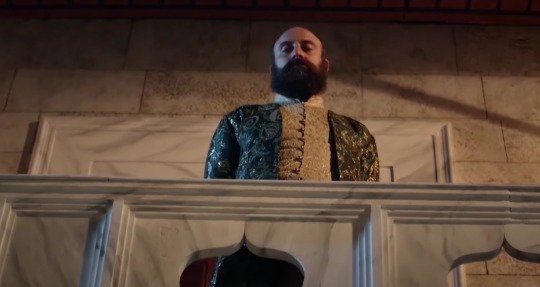
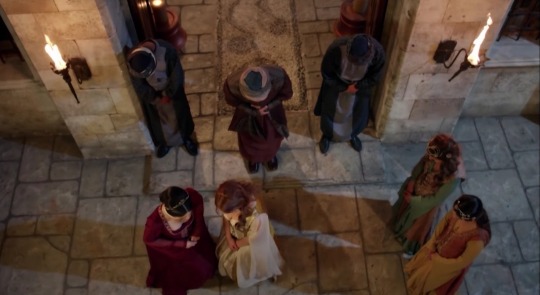
And then they're stopped by... Süleiman himself and I love that, because they have to stop because he comes, they have to stop because he's watching them and give him the necessary respect. Symbolically, it could be a showcase of him being the decider of everyone's fates and them having to accept his will at the end of the day.
And after he leaves, of course, Hürrem and Mahidevran prepare to carry on with their bickering, as they usually do. While that's the end of the whole confrontation, their expressions tell us it's not over yet.
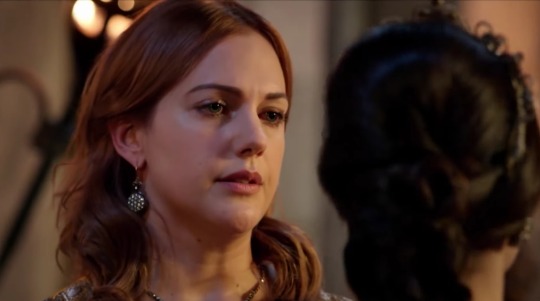
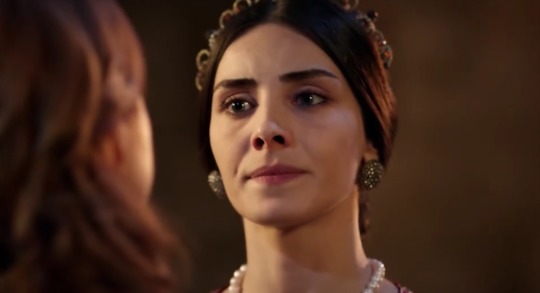
It's particularly interesting, even as a confrontational scene alone: it's longer than many of the confrontational scenes between them, it speaks more volumes about the opposing sides than any other of the kind has dreamed to. While I love Mahidevran and Hürrem's chemistry, I wish there were more scenes like this one, more nuanced interactions than vitriol and constant, almost formulaic smackdowns. Because, to me, this whole confrontation, while simple at hindsight, raised the bar to what could we have had. The rivalry of the two ladies is fascinating on a thematic level and not exploring its depth further, would be a myriad of wasted opportunities.
This scene did right all you could think of: composition, soundtrack, attention to detail, chemistry, dialogue and opposing two sides on a respectful, unbiased, while narratively provoked, way. I adore the way it aged: as I said, it created a perfect blend between context of the episode/plot arc and retroactive irony and the mix of cause and effect of soapy intrigues, character exploration through lines and all the coming thematic stuff, while being filled with dynamic and fun energy. And it's absolutely sublime for it.
#i planned to only use images at first#but since Tumblr now allows only up to 10#I had to quote most stuff#magnificent century#muhteşem yüzyıl#mahidevran sultan#hurrem sultan
48 notes
·
View notes